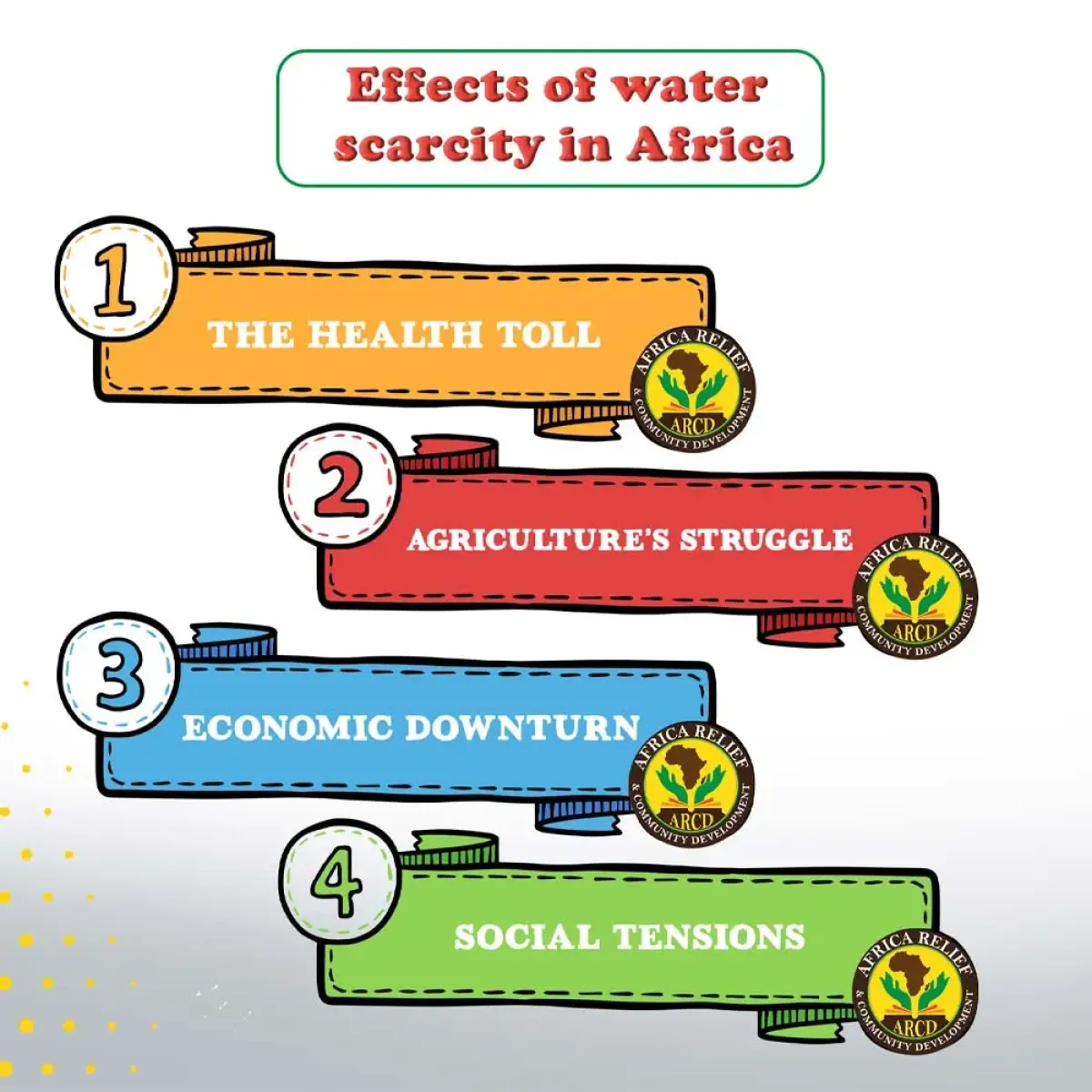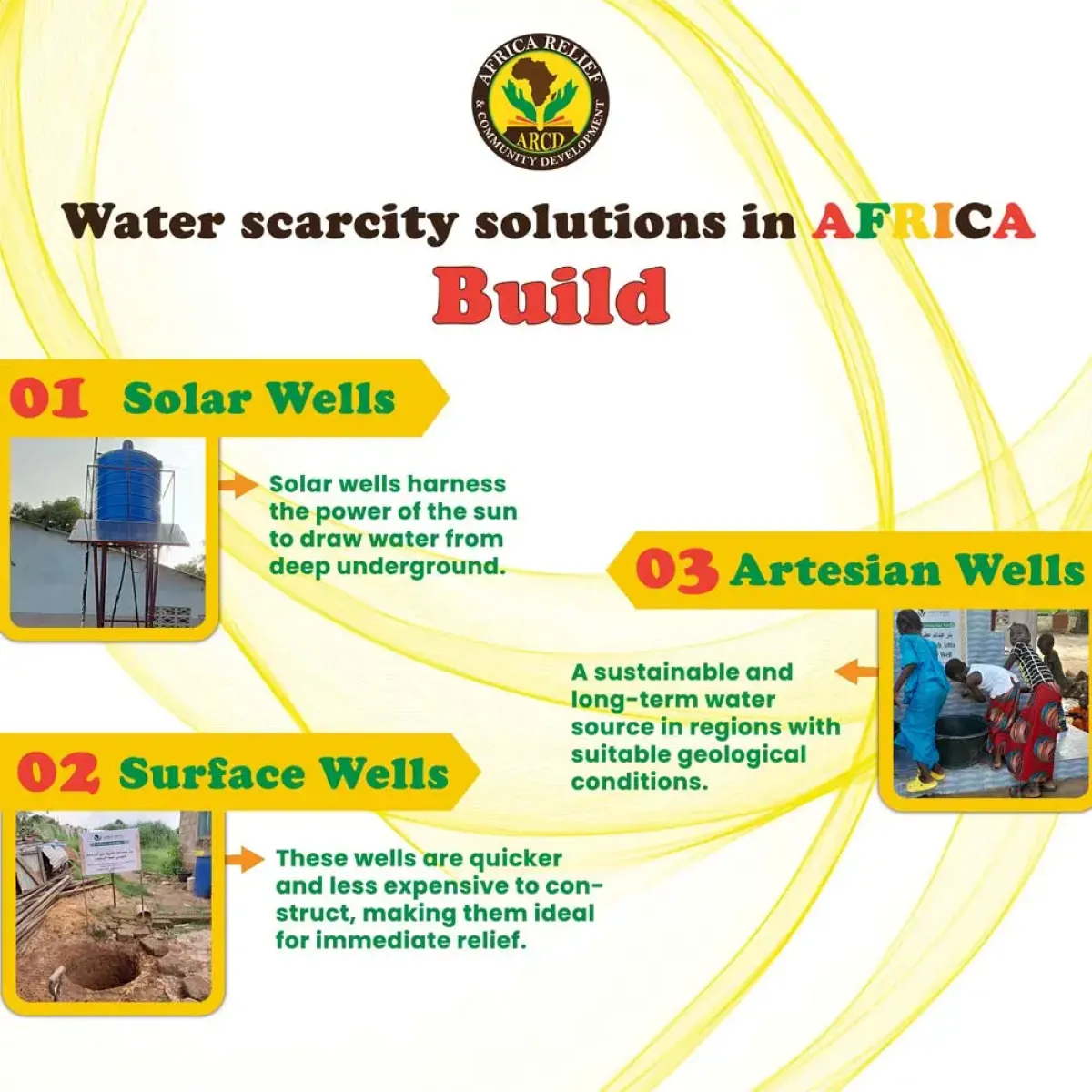Millions of people in Africa are experiencing water scarcity and struggle to gain for access to clean, potable water each day. This painful reality demands our attention and concerted action.
Water scarcity is increasing due to population growth and climate change. By 2025, nearly 230 million Africans will confront water scarcity, and up to 460 million will inhabit water-stressed regions. These numbers are not mere statistics; they represent the struggle of families, children, and entire communities as they grapple with the scarcity of this essential resource.
In the face of this challenge, humanitarian organizations play a key role. Through innovative projects and relentless efforts, we can bring hope and sustainable water solutions to those in need. By building wells and educating communities on sustainable practices, we transform lives and future generations.
Water Scarcity in Africa
Water scarcity affects all facets of life in Africa. Let’s delve into its staggering statistics and far-reaching effects:
1 in 3 Africans lack access to basic drinking water, a fundamental human right.
400 million people in sub-Saharan Africa grapple with severe water scarcity, struggling to meet their daily water needs.
Africa bears the brunt of global water scarcity, with 11 out of 17 countries experiencing water stress.
An estimated 800 million Africans could face water scarcity by 2050, exacerbating the crisis.
These statistics are a stark reminder of the Africa water crisis’s urgency and far-reaching consequences.
Water scarcity means severely limited access to clean drinking water, sanitation, hygiene, and agricultural productivity.
The crisis disproportionately affects women and girls, who often bear the primary responsibility for water collection, further limiting their educational and economic opportunities.
ARCD’s artesian and solar-powered water wells are a critical part of the response to the African water crisis, providing access to clean water to the most-affected communities. We are committed to providing immediate relief, supporting long-term solutions, and implementing sustainable water management practices.
Why is there water scarcity in Africa?
The Africa water crisis is a complex and multifaceted issue with a range of contributing factors. Here are some of the key reasons why water scarcity is such a pressing challenge in Africa:
- Climate change: Climate change is a major driver of water scarcity in Africa. Rising temperatures, erratic rainfall patterns, and more frequent and severe droughts are all contributing to a decrease in water availability.
- Population growth: Africa’s population is growing rapidly, and this is putting an increasing strain on water resources.
- Infrastructure gaps: Many African countries lack the infrastructure needed to collect, store, and distribute water effectively. This includes dams, reservoirs, pipelines, and treatment plants. As a result, a significant amount of water is lost through leakage and evaporation.
- Unsustainable practices: Overexploitation of groundwater, pollution of water sources, and inefficient irrigation practices are all exacerbating the water crisis in Africa.
- Poverty: Poverty is a major obstacle to addressing water scarcity. Poor communities often lack the resources and knowledge they need to access clean water and manage water resources sustainably.
Effects of water scarcity in Africa
The Africa water crisis is not merely a shortage of a precious resource; it is a catalyst for a cascade of detrimental effects that reverberate across various aspects of life in Africa.

The Health Toll
Limited access to clean water and sanitation increases the prevalence of waterborne diseases such as diarrhea, cholera, and typhoid, disproportionately affecting vulnerable populations like children and the elderly.
These diseases not only cause immense suffering but also strain healthcare systems and hinder economic productivity.
Agriculture’s Struggle
Agriculture, the backbone of many African economies, is severely crippled by the Africa water crisis.
Erratic rainfall patterns, prolonged droughts, and the depletion of water resources make it increasingly difficult for farmers to cultivate crops and raise livestock.
This decline in agricultural productivity translates into food insecurity, malnutrition, and increased poverty, particularly in rural communities.
Economic Downturn
The Africa water crisis casts a long shadow over economic development.
Water scarcity disrupts industries that rely heavily on water, such as manufacturing, hydropower generation, and tourism.
This economic fallout further exacerbates poverty, unemployment, and social unrest, hindering Africa’s progress towards sustainable development.
Social Tensions
The competition for scarce water resources can fuel social tensions and conflicts within and between communities.
As desperation mounts, disputes over water access can escalate into violence, jeopardizing social stability and hindering peaceful coexistence.
Water scarcity solutions in Africa

One of the most effective solutions to combat water scarcity in Africa is the construction of various types of wells. Each type offers unique benefits tailored to different geographical and environmental conditions.
- Build Solar Wells: Solar wells harness the power of the sun to draw water from deep underground. This sustainable and eco-friendly solution is particularly beneficial in regions with abundant sunlight. Solar wells reduce the reliance on non-renewable energy sources and ensure a steady water supply even in remote areas.
- Build Surface Wells: Surface wells, or shallow wells, tap into water sources closer to the earth’s surface. These wells are quicker and less expensive to construct, making them ideal for immediate relief in water-stressed areas. Regular maintenance and monitoring ensure that the water remains clean and safe for consumption.
- Build Artesian Wells: Artesian wells are a sophisticated solution, utilizing naturally pressurized aquifers to bring water to the surface without the need for pumping. These wells can provide a sustainable and long-term water source, particularly in regions with suitable geological conditions.
By implementing these diverse well solutions, we can make significant strides in addressing the water crisis in Africa. Each well constructed is a step towards a future where clean, accessible water is a reality for all Africans. Through collective efforts and continued innovation, we can transform lives and foster resilient communities across the continent.
Africa Relief: Sustainable Water Solutions
Africa Relief is committed to addressing the Africa water crisis through a combination of technological interventions, policy advocacy, and community-based initiatives.
We work closely with local communities, governments, and partners to implement sustainable water solutions that meet the specific needs of each region.
- Donate: Your financial contributions enable us to provide immediate relief and support long-term solutions.
- Volunteer your time: Share your skills and expertise to support our programs and initiatives, making a direct impact on the lives of those affected by water scarcity.
- Spread awareness: Raise your voice and educate others about the Africa water crisis. Share our stories and encourage others to join the fight for water.
Together, we can make a difference in the fight against the Africa water issue. With your support, we can ensure that everyone in Africa has access to clean, safe water, a fundamental human right for a healthy and productive life.
